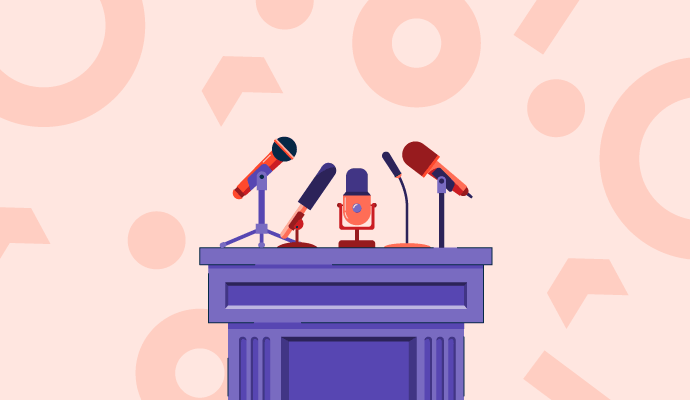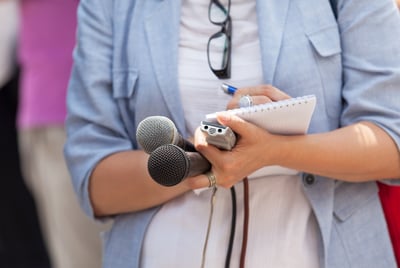October 1, 2025
 by Ninisha Pradhan / October 1, 2025
by Ninisha Pradhan / October 1, 2025

Ever launched a big announcement only for it to fall flat?
That’s a PR pro’s worst nightmare, and often, it comes down to one thing: a poorly planned press conference.
A press conference is a public event where an organization or individual delivers information to journalists and answers media questions. It is used to announce news, clarify issues, or make statements. Press conferences ensure wide media coverage and allow direct communication with the public through the press.
Press conferences are not just for politicians and celebrities. It has evolved far beyond a podium and a question-and-answer session. Today, they’re immersive brand moments, part media event, part product demo, sometimes even full-scale shows, designed to tell your story in a way that sparks coverage, conversation, and credibility. Companies use them to launch products, announce major milestones, and shape public perception on their own terms.
When done right, press conferences drive high-impact coverage and credibility. When done poorly, they waste time, erode trust, and fail to move the needle. That’s why preparation, relevance, timing and using the right rool matters.
In this guide, we’ll break down what a press conference is, when to hold one, and how to make yours worth the media’s time.
Press conferences aren’t just about making announcements; they’re about what those announcements achieve. A well-planned event can influence public opinion, strengthen media relationships, and position your company as a credible voice in the industry.
Of course, PR materials like press releases, boilerplates, and media kits are great ways to get your messages heard, but press conferences are the way to go regarding a special occasion or pressing issue. It helps
Knowing when to hold a press conference takes practice. If your situation falls into one or more of the following, it's time to start planning one:
Several occasions warrant a conference. Here are a few examples of where businesses often hold press conferences:
Not every announcement needs the spotlight of a press event. Hosting one for the wrong reasons can waste resources, hurt credibility, and even damage relationships with journalists. So ask yourself if your story truly deserves a press conference. If it falls into any of these categories, a press release or social announcement is likely a better choice:
As you may know by now, a press conference is a media event where speakers make statements and respond to questions from the attending journalists. But how do you get to the point of holding it?
The easiest way to break down the preparation for press conferences is by dividing your plan into three stages: before, during, and after. That way, you can focus on one moving part at a time, not juggle many things at once.
You need to complete most of the work before a press conference. The most important part of the preparation is media outreach. Create an intriguing topic to attract the media to your event. FOMO (fear of missing out) makes the press get you the media coverage you want.
The ideal time to start preparing for a press conference is two weeks, but sometimes you have to act even before the scheduled time. Preparing for a press conference takes much longer than the press conference itself.
Organizing a press conference starts with the planning stage. At this stage, you start from scratch and work your way up to the point where you can run it smoothly. The success of a press conference relies largely on planning. If done poorly, the resulting event won’t be successful.
Take ample time to plan. You don’t want to rush at the 11th hour. It’s good to start planning a few weeks before the press conference. Not only does this ensure that you have enough time to put everything together, but you also have more room to make any last-minute adjustments.
When planning a press conference, here are some areas to focus on.
The primary goal of a press conference is to spread information among stakeholders. It’s crucial to pick a relevant topic that serves as a vehicle for the business to convey its message.
Ask yourself the following questions before choosing the agenda and topic:
Journalists are always on the lookout for the next newsworthy event. If your topic isn’t compelling enough to cover, they won’t be interested in attending your conference.
When conducting a press conference, you cannot schedule any random day and time or decide solely on whether the speaker is free. Instead, choose a date for your team and the attending journalists. Don’t delay it to the extent that your statement is no longer of interest to the media.
The time of a press conference is also critical. It’s best to choose when the media are most likely to attend. Do it at a time when you can maximize press coverage with maximum media participation.
Ensure your press conference doesn’t coincide with another event that may divert journalists' attention. Consider the schedule of the invited media members, especially with work deadlines or other important events.
A press conference's location is as important as the date and time. Getting to the venue should be easy for journalists. A long travel time can discourage them from attending the event.
Ideally, the location should be relevant to your event or announcement. Most businesses hold press conferences at their headquarters, particularly in large rooms or areas to accommodate large groups. For a successful press conference, the location should have all the necessary facilities and equipment, including network access, parking, and other tools and utilities for reporters.
Choosing an attractive location is key. It’s difficult to hold a press conference in a confined space with poor lighting and ventilation. This can negatively impact your brand perception.
A place that facilitates interaction and communication helps you reach the right audience. If your press conference takes place on a busy street or thoroughfare, your audience has difficulty hearing you, and the speakers can’t concentrate because of excessive noise.
Media conferences involve two important players: the speaker and the moderator.
The speaker represents a business or company at a press conference. They deliver the message, announce the news, and answer journalists’ questions, so you need to choose them wisely.
Regardless of whether the speaker is a senior member or intimately familiar with the company, they must study and train for the event. Going prepared is always better than going on the fly. Spontaneity is appreciated, but it cannot be the backbone of the entire event.
Your speaker (s) should prepare and share the key points during the press conference. The person speaking on behalf of your client or company must be aware of potential media scrutiny and hostility when dealing with a sensitive subject.
Once you've determined a suitable date, time, and location for your press conference, you can contact the people you want to attend. Get in touch with reporters and journalists and media organizations, and news agencies you’d like to invite.
Always emphasize the main topic and the speaker's details when contacting media reps. If you invite the media a week or more in advance, send a follow-up email the day before.
A press release is an invitation to the media for the press conference. Include the press conference's date, time, and location in your press release. Also, add why you’re holding it and a compelling hook to attract the reporters.
Send your press release at least a week before the event date. You can use press release distribution software to mass release your news to reporters. Get in touch with the media people you want to attend the launch via email or direct phone, even if it’s about the distributed press release.
Tip: Learn how to write a press release in time for your next press conference.
A press kit provides reporters with an overview of the event and other important information. These kits contain folders with your topic, message, or issue.
If the press conference takes place outside your workplace, it's your responsibility to supervise and handle the event logistics, including the venue reservations. As part of your planning, finalize all vendor arrangements for lighting, catering, and sound, which will help you avoid any last-minute changes.
Tip: Prepare for a PR crisis before it happens to make planning your press conference easier.
Start by preparing the room on the day of the conference. Test out everything you’ll use. Additionally, create name cards, organize extra seating, and provide beverages such as water and coffee.
It’s the day of the conference, and you’ve done everything possible to prepare. When the media arrives, welcome them and sign them in with their contact information. Guide them to their seats and start the event on time.
Nobody likes wasting time. Starting on time is crucial to your event’s success and imperative in making reporters want to attend your next press conference.
Here’s what a standard press conference flow usually looks like:
You can have a moderator keep track of time and call on reporters. This helps take some pressure off the speaker and focus on answering questions calmly and collectedly.
Congrats! The most stressful part is done. If you followed these steps, there’s no reason your press conference isn’t a resounding success. Here’s how to maximize the impact of your press conference:
A press conference can have many advantages and disadvantages, given the scope of its organization and the speakers involved. Here are some of the most common pros and cons of hosting press conferences that’ll help you decide whether holding one makes sense.
Press conferences offer a host of advantages. Let’s look at some of the benefits of planning and executing a conference:
While press conferences provide many advantages, there are a couple of drawbacks as well, namely:
Most press conferences last 45 to 60 minutes. The main announcement or presentation typically takes around 10–15 minutes, followed by a Q&A session that lasts 30–45 minutes. It’s best to keep the event concise and tightly structured — long enough to deliver key messages but short enough to hold media attention.
The main purpose of a press conference is to share important news directly with the media and ensure the story is communicated accurately and widely. It’s often used for major announcements like product launches, leadership changes, partnerships, crisis responses, or company milestones. Press conferences also allow journalists to ask questions, which builds transparency and credibility.
Press conferences offer several key advantages:
Typically, journalists, reporters, editors, and media representatives are invited to press conferences. Depending on the event, companies may also invite industry analysts, influencers, partners, or stakeholders. It’s important to curate the guest list to include people who can amplify your story and provide valuable coverage.
To get your event covered by the media, focus on the following steps:
Press conferences should improve your public image, not damage it. Preparation is key to representing your company or client better. By segregating the preparation for the press conference, you can ensure a well-attended event.
A press conference is another tool in a communications specialist’s belt. Learn how to make a PR plan and realize the full spectrum of a well-crafted public relations strategy.
This article was published in 2023 and is updated with new information.
Ninisha is a former Content Marketing Specialist at G2. She graduated from R.V College of Engineering, Bangalore, and holds a Bachelor's degree in Engineering. Before G2, Ninisha worked at a FinTech company as an Associate Marketing Manager, where she led Content and Social Media Marketing, and Analyst Relations. When she's not reading up on Marketing, she's busy creating music, videos, and a bunch of sweet treats.
Have you ever thrown a party only to find out no one is coming?
 by Deirdre O'Donoghue
by Deirdre O'Donoghue
In this digital day and age, any and every experience can be turned into combinations of 1s...
 by Chanakya Kyatham
by Chanakya Kyatham
Every great event planner knows that the key to a successful event is an engaging environment.
 by Hannah Tow
by Hannah Tow
Have you ever thrown a party only to find out no one is coming?
 by Deirdre O'Donoghue
by Deirdre O'Donoghue
In this digital day and age, any and every experience can be turned into combinations of 1s...
 by Chanakya Kyatham
by Chanakya Kyatham


